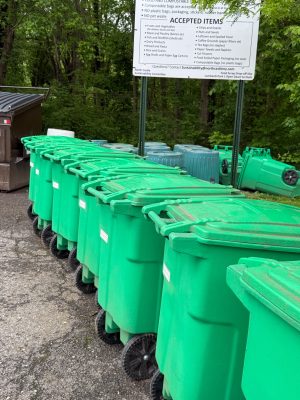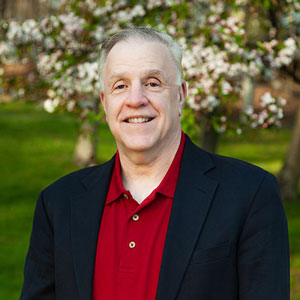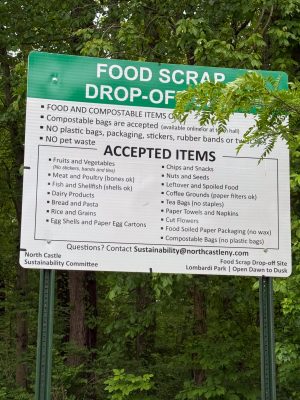‘Food Isn’t Trash’: More Westchester Communities Turn Scraps Into Community Gold
News Based on facts, either observed and verified directly by the reporter, or reported and verified from knowledgeable sources.
By Chloe Kohl
When Scarsdale residents Ron Schulhof and Michelle Sterling first started knocking on doors and posting flyers about food scrap recycling, they didn’t know how many locals would actually listen.
Eight years later, their grassroots effort has helped spark a growing movement across Westchester, with more and more communities launching programs of their own, including North Castle, Mt. Kisco, Pleasantville, Cortlandt, and more.
To cut down on household waste and reduce the environmental toll of landfills, these communities have embraced food scrap recycling and are working to expand access.
It all started in January 2017, when Scarsdale opened the first drop-off food scrap recycling site in Westchester, paving the way for others to follow.
The now robust Scarsdale program is a far cry from the program’s early beginnings, when co-founders Schulhof and Sterling were scurrying to write articles, and doing “zero-waste events at houses of worship” to get the word out.
“There’s no silver bullet,” Sterling remarked in a phone interview with The Examiner. “You have to keep trying a bunch of things. It’s a process, but if you keep going, you will get sign-ups.”
The program’s 2018 expansion to curbside pick-ups, which allowed residents to leave food scraps at the end of their driveway along with their waste and recycling bins, led to a vast increase in participation, the team noticed.
Due to the success of their program, Schulhof and Sterling have helped many other municipalities get their programs off the ground, extending beyond Westchester and even outside of New York State.
Sterling attributes part of the success to the program’s accessibility and inexpensiveness, referring to the low cost of the composting kits: residents pay only $25 for a large kit, which is comprised of a countertop pail, a roll of compostable bags, and a large wheeled bin for the curb. When helping other local communities, these are two factors that Sterling stresses.
“There is a lot we can do in our everyday life to really make a difference,” she explained. “We all eat, and we all have food scraps. Everyone can be a part of the solution and help with waste reduction.”

More Than Compost
Residents who sign up for food scrap recycling in Scarsdale are instructed to keep a small pail in their homes and fill it with whatever they can scrape off of their plates. Once the pail is full, the scraps are then emptied into a larger receptacle at the town’s drop-off location or simply picked up curbside, and everything is composted to make rich, nutrient-dense soil.
Food scrap recycling programs differ from backyard composting in their abilities to process a wide variety of food waste. Home gardeners know to keep bones and meat out of their compost piles, as they take disproportionately longer to decompose than other household food waste and leave a compost pile vulnerable to scavenging by critters like raccoons. However, the high heat and carefully monitored aerobic conditions of industrial composting ensure that scraps of meat, bones, and other no-go’s for home composters can be processed.
While gardeners revel in the direct benefits of food scrap recycling programs (Scarsdale offers ‘Free Compost Giveaways’ at times), those without green thumbs can also see community benefits in their food scrap contributions, as compost from food scrap recycling programs can be used to enrich landscaping and verdant spaces around the town.

Cortlandt Tries Curbside
Following Scarsdale’s success, in 2023 Cortlandt opened a food scrap recycling program with two drop-off sites: one at the Cortlandt Youth and Recreation Center, and the other at the Muriel H. Morabito Community Center. Cortlandt Town Supervisor Dr. Richard Becker estimates that since the receptacle launched, more than twelve tons of food scraps have been picked up.
“The program is both economically incentivizing and environmentally smart,” Becker explained to The Examiner. The town is charged a reduced fee for processing food scraps as opposed to regular waste, allowing the initiative to benefit the town beyond its environmental rewards.
Every Friday, over 15,000 Cortlandt residents receive a newsletter promoting the program. Social media and signs posted around Cortlandt have also been influential in spreading the word.
“Each week,” Becker said, “the program seems to grow more and more.”
In addition to reducing waste, residents also see the direct effects of the compost. Recycled food scraps were used in the soil around the Cortlandt Waterfront Park and in ball fields.
Despite the success of the program, Becker noted, “most people don’t have the time or inclination to drive to a drop-off location,” a rationale that has inspired the town to pursue curbside pick-up.
Cortlandt is working alongside State Senator Pete Harckham to establish this program.
“We are optimistic that we can get a grant to pay for a dedicated composting
truck,” Becker remarked. To ensure that the program is entirely green, the vehicle would be electric as well.
As a gardener himself, Becker has been composting for years, and emphasized that the program has been “truly tremendous.”
Cortlandt hopes the curbside program will launch by 2026, ideally increasing both accessibility and participation.

An Ecological Imperative
Local sustainability organizations are tracking the progress of these programs. In a phone interview with The Examiner, Travis Carpenter of the Westchester Alliance for Sustainable Solutions (WASS) said that “a lot of municipalities have put up pick-up locations for food scraps in the past few years.” Despite this initial interest, there could be more—WASS is “trying to increase the scope of these programs.”
Emissions from Peekskill’s Wheelabrator Westchester incinerator, which burns the household waste of many municipalities, are part of the reason some are pursuing food scrap recycling, he said. Carpenter, in a letter to the editor for Black Westchester, explained the trouble of disposing of food scraps through incineration.
When incinerated, food scraps like eggs and fruits cause the machine to “burn more fuel” and “work inefficiently.” Some studies have additionally traced waste incinerators to a score of health problems in the communities surrounding, something WASS worries could be exacerbated with the incineration of food scraps in Peekskill.
Furthermore, food scraps left to rot in a landfill release methane (CH4), a potent greenhouse gas which traps CO2 in the atmosphere and is attributed in part to rising global temperatures.
To address these key issues, many towns in Westchester have joined the fight for zero waste.
New Castle opened its program on May 29 of 2018, also recognized as National Learn About Composting Day. The Village of Mount Kisco and Pleasantville followed suit, opening their programs in late 2019.
Similar to the efforts posed by Scarsdale and Cortlandt, residents of these communities can purchase composting kits and later bring food scraps to their respective drop-off locations.
Outside of Westchester, other communities are also turning to compost. As of April 1, all New York City residents are required to separate food scraps from their waste. Property owners face the risk of fines if this mandatory separation is not followed.
New York City’s program is a promising start to the adoption of food scrap recycling statewide.
“We have to realize that we can’t throw anything away,” Carpenter stressed.
“Burning is harmful to the environment, and food scrap recycling is an alternative.”
Just Getting Started
North Castle’s food scrap recycling program opened in February of last year. More than a year later, the sustainability committee is still working to increase participation and spread awareness of the importance of composting.
North Castle’s receptacle at Lombardi Park is open from dawn to dusk and accepts all types of food, ranging from fruit, meat, dairy, and bread products. In addition to food, paper towels and napkins are also compostable there.
Around 750 pounds of food scraps are collected by Suburban Carting weekly, as estimated by the sustainability committee. Although this is a promising start, committee members remain hopeful for even greater turnout in the future, as well
as more sustainable events.
“My hope is for Armonk to invest in community education campaigns to boost awareness of the whole food cycle and to increase participation in food scrap recycling,” Liva Fleming, a member of North Castle’s Sustainability Committee, wrote in an email to The Examiner. “I would love to see North Castle partner with local farms, create a community garden, and maybe a farmer’s market or some sort of Earth-celebrating event.”
Students from the Byram Hills Sustainability Initiative surveyed more than 70 North Castle town members and found that roughly 20 percent of respondents were aware of the town’s new initiative.
The Sustainability Committee hopes to expand its outreach, aiming to advertise at community events like Armonk’s Frosty Day Parade.
“Food isn’t trash,” Jaclyn Walker, another member of the committee, stated in an email to The Examiner. “Our food waste recycling program takes little effort and accomplishes a big goal: removing food from incineration. I know if we all paid more attention, we can change. It just takes a little care, and we’d create a cleaner environment now and for the next generation.”

Examiner Media – Keeping you informed with professionally-reported local news, features, and sports coverage.
